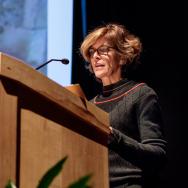Seeing, hearing, smelling, tasting, touching. Ask anyone around you to name the senses, and they would almost certainly pick those five definitions—ones that trace back through centuries of Western thinking.
They also would be wrong.
Teju Cole challenged the traditional concept of the senses on April 8, during the first of three public lectures at the University of Chicago’s Logan Center for the Arts. The acclaimed writer and photographer introduced two wrinkles: That there are anywhere from nine to 21 senses, depending on how you categorize receptors; and that our senses are not distinct, often blending into each other to inform our perception of the world.
Titled “Coming to our Senses,” Cole’s talks are part of the Randy L. and Melvin R. Berlin Lectures, which began in 2014 and were founded to host leading thinkers from around the world and across the arts, humanities, and humanistic social sciences.
The author of the award-winning novel Open City and the essay collection Known and Strange Things, Cole teaches creative writing at Harvard University and serves as the photography critic for The New York Times Magazine. He is also curating an exhibit called “Go Down Moses,” which will open this July at Columbia College’s Museum of Contemporary Photography.
Last month, Cole described his lectures as a chance to contribute to UChicago’s tradition of “truly serious thinking.”
Speaking before a crowd of more than 400 on Monday, Cole delivered a wide-ranging, hourlong talk that was itself a multisensory experience. He drew from a diverse set of sources, from a 15th-century Northern English poem, to a 17th-century painting by Pieter Claesz, to a 1929 study on how sounds map onto visual images.
At one point, he even broke into song.
Music informs Cole’s own work in other mediums. Discussing his current project of photos shot in Switzerland, he used piano chords to describe his editing.
“A sequence of images works when the individual images have that crystalline sound quality,” Cole said, “as though they were being played by the same player on the same piano, with a kind of consistent attack, though the individual notes in the clusters keep changing.”
Cole recalled another instance of his senses mingling. He took the audience back more than a decade to a hike through the hills of Nigeria, the country where he grew up after leaving Michigan as a five-month-old. Near the end of the trail grew a jasmine bush. When he plucked the petals and took a breath, a cloud of butterflies burst up—searing together for him the sight and the smell.
That memory rushed back during Cole’s recent trip to the grocery store, when he purchased a half-ounce bottle of jasmine essential oil for $14.95. His thoughts were prosaic, flitting from the class he just taught, to dinner, to the “ridiculous price of the jasmine.”
“But the moment I closed my eyes and put that vial up to my nose,” he said, “I was on a sunny hilltop in Nigeria, surrounded by an apparition of white butterflies.”
Cole will continue his talks, which he described as a three-hour lecture delivered across three weeks, on April 15 at 6 p.m. at the Logan Center. A book signing will follow the lecture, which will focus on how writing about the senses leads to epiphany. The series will conclude on April 22 with a lecture on how senses foster a moral understanding and ethical obligation to others.
All lectures are free, but attendees must register separately for each event.

